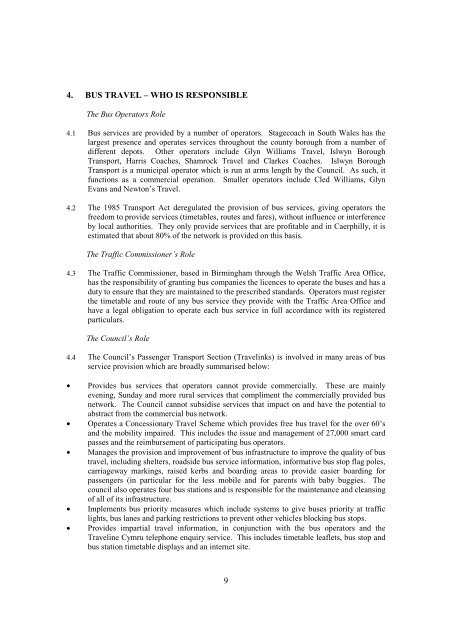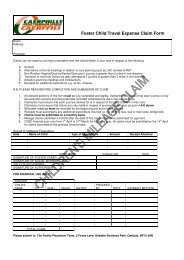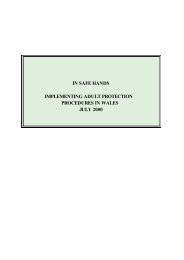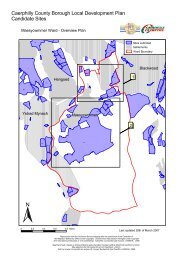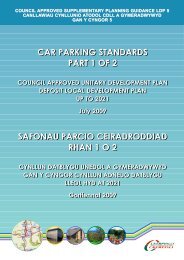LOCAL BUS STRATEGY STRATEGAETH BWS LLEOL
LOCAL BUS STRATEGY STRATEGAETH BWS LLEOL
LOCAL BUS STRATEGY STRATEGAETH BWS LLEOL
You also want an ePaper? Increase the reach of your titles
YUMPU automatically turns print PDFs into web optimized ePapers that Google loves.
4. <strong>BUS</strong> TRAVEL – WHO IS RESPONSIBLE<br />
The Bus Operators Role<br />
4.1 Bus services are provided by a number of operators. Stagecoach in South Wales has the<br />
largest presence and operates services throughout the county borough from a number of<br />
different depots. Other operators include Glyn Williams Travel, Islwyn Borough<br />
Transport, Harris Coaches, Shamrock Travel and Clarkes Coaches. Islwyn Borough<br />
Transport is a municipal operator which is run at arms length by the Council. As such, it<br />
functions as a commercial operation. Smaller operators include Cled Williams, Glyn<br />
Evans and Newton’s Travel.<br />
4.2 The 1985 Transport Act deregulated the provision of bus services, giving operators the<br />
freedom to provide services (timetables, routes and fares), without influence or interference<br />
by local authorities. They only provide services that are profitable and in Caerphilly, it is<br />
estimated that about 80% of the network is provided on this basis.<br />
The Traffic Commissioner’s Role<br />
4.3 The Traffic Commissioner, based in Birmingham through the Welsh Traffic Area Office,<br />
has the responsibility of granting bus companies the licences to operate the buses and has a<br />
duty to ensure that they are maintained to the prescribed standards. Operators must register<br />
the timetable and route of any bus service they provide with the Traffic Area Office and<br />
have a legal obligation to operate each bus service in full accordance with its registered<br />
particulars.<br />
The Council’s Role<br />
4.4 The Council’s Passenger Transport Section (Travelinks) is involved in many areas of bus<br />
service provision which are broadly summarised below:<br />
• Provides bus services that operators cannot provide commercially. These are mainly<br />
evening, Sunday and more rural services that compliment the commercially provided bus<br />
network. The Council cannot subsidise services that impact on and have the potential to<br />
abstract from the commercial bus network.<br />
• Operates a Concessionary Travel Scheme which provides free bus travel for the over 60’s<br />
and the mobility impaired. This includes the issue and management of 27,000 smart card<br />
passes and the reimbursement of participating bus operators.<br />
• Manages the provision and improvement of bus infrastructure to improve the quality of bus<br />
travel, including shelters, roadside bus service information, informative bus stop flag poles,<br />
carriageway markings, raised kerbs and boarding areas to provide easier boarding for<br />
passengers (in particular for the less mobile and for parents with baby buggies. The<br />
council also operates four bus stations and is responsible for the maintenance and cleansing<br />
of all of its infrastructure.<br />
• Implements bus priority measures which include systems to give buses priority at traffic<br />
lights, bus lanes and parking restrictions to prevent other vehicles blocking bus stops.<br />
• Provides impartial travel information, in conjunction with the bus operators and the<br />
Traveline Cymru telephone enquiry service. This includes timetable leaflets, bus stop and<br />
bus station timetable displays and an internet site.<br />
9


